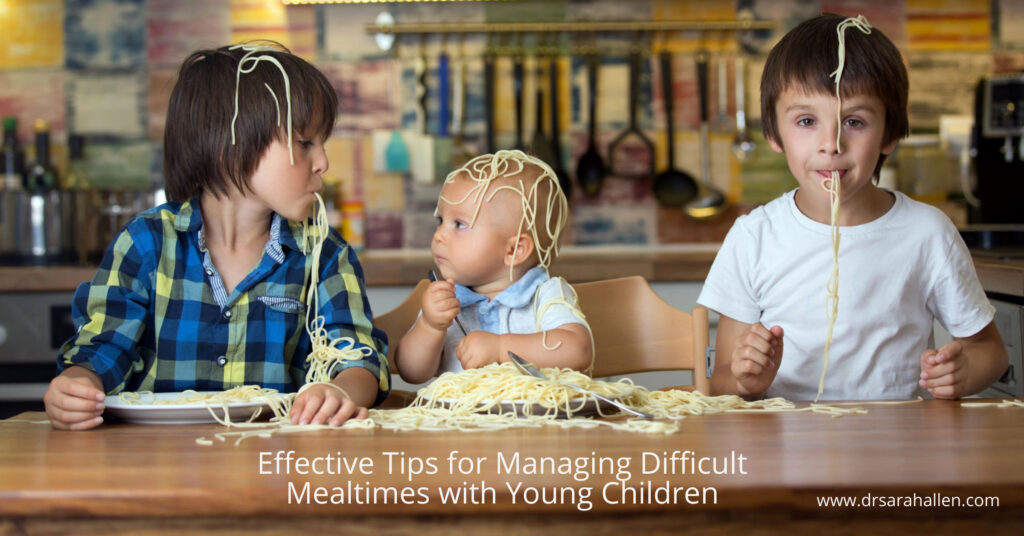
Mealtimes with preschoolers can often be more about persistence than peace, especially when faced with picky eating habits and unexpected tantrums. As a seasoned parenting coach, and parent of 3 children, I understand the challenges that come with having young children. Dealing with difficult mealtimes requires patience, creativity, and a consistent approach, all above all, keeping calm which I know is easier said than done.
In this article, I will explore a variety of effective strategies to manage difficult mealtimes. Whether it’s dealing with a fussy eater or teaching mealtime manners, or just keeping them sitting at the table, the upcoming tips are designed to equip parents with tools that foster a positive eating environment and encourage healthy habits from an early age.
Understanding Picky Eaters
Understanding why young children become picky eaters is the first critical step toward managing difficult mealtimes. Many toddlers and preschoolers exhibit picky eating behaviors as they start to develop personal preferences and assert independence. It is a normal part of their development and provides them with a sense of control over their environment. Recognizing this can help alleviate frustration during mealtimes and set the stage for finding practical solutions.
Start by introducing a variety of foods in small, manageable portions. This reduces the overwhelm and gently encourages your child to explore new tastes without the pressure of finishing an entire serving. It’s essential to introduce new foods alongside familiar favorites to ensure there’s always something on the plate that your child feels comfortable eating.
Creating a Positive Mealtime Environment
The atmosphere during mealtime can significantly impact a child’s eating behavior. A positive, stress-free environment encourages better eating habits and can make mealtimes enjoyable rather than a battleground. Start by setting regular meal and snack times. A structured schedule adds predictability to mealtimes, which can be very soothing for preschoolers.
Minimize distractions at the table. This means turning off the TV, putting away electronic devices, and avoiding loud noises or disruptions. Keeping the focus on eating and interacting with family during mealtime can help your child concentrate on their meals and be more receptive to trying new foods.
Engage your child in conversation about easy topics or what they’re enjoying about their meal rather than focusing solely on how much or what they are eating. This can create a relaxed atmosphere that naturally encourages more open and unstressed responses to eating.
Modeling and Encouraging Good Behavior
Children learn by example, so it’s important that as a parent, you try to model the behavior you expect to see. Sitting together at dinner and showing interest in your own meal demonstrates positive eating behavior. Comment on the flavors and the textures of your food; show enthusiasm. This curiosity can be contagious and can often entice a preschooler to mimic your actions and try something new.
When your child exhibits good behavior at the table, regardless of how small, it’s important to acknowledge it. Positive reinforcement goes a long way in ensuring these behaviors are repeated. Compliment them for trying a new food, or for eating without causing a fuss, and avoid negative remarks about undesirable behavior. This builds their confidence and reinforces the positive aspects of mealtime without focusing solely on the food.
Moreover, avoid turning mealtime into a battle of wills. Forcing a child to eat can heighten anxiety and lead to power struggles. Instead, offer choices within boundaries. For example, you might let your child decide which vegetables they want to include in their meal, giving them a say in their diet but still ensuring they eat nutritiously.
Teaching and Maintaining Mealtime Manners
Teaching mealtime manners can be another aspect of managing difficult mealtimes. Start with basic manners such as saying “please” and “thank you,” using utensils, and not speaking with a full mouth. Keeping expectations clear and age-appropriate helps prevent feelings of overwhelm.
Consistency is key in teaching these manners. Gently remind your preschooler of the rules during each meal and be patient as they learn to incorporate these habits into their routine. Remember, preschoolers are still learning and developing, and mastering table manners will take time.
Provide small, manageable tasks that they can handle, such as setting their place at the table or helping to clear their plate after eating. These responsibilities make them feel involved and valued, reinforcing their role at the table and encouraging them to participate more actively during mealtime.
Navigating Mealtime Tantrums
Lastly, handling mealtime tantrums with care and strategic planning can significantly ease the stress of mealtimes. If a tantrum occurs, it’s crucial to remain calm. Address the behavior calmly and firmly — explain that while being upset is okay, disruptive behavior is not acceptable.
Offering a calm-down space where they can go to regain composure before returning to the table can be effective. Mealtime tantrums often happen because a child feels overwhelmed, so keeping your child’s needs in mind, such as their hunger and tiredness levels before mealtime, can prevent such outbursts. Often, a snack before dinner or moving mealtime earlier can make a notable difference in your child’s mood and how they handle meals.
Fostering Peaceful Family Mealtimes
Navigating the challenges of mealtime with young children can be transformed into an opportunity for teaching valuable life skills, from healthy eating habits to manners and emotional regulation. By embracing these strategies with consistency and positivity, you can turn mealtime struggles into more enjoyable family dinnertimes. Remember, the key to success is patience, modeling positive behaviors, and creating an encouraging environment for your child to explore and enjoy their meals.
If you find yourself needing further guidance on managing difficult mealtimes or if you need parenting help either in person at my Northbrook office or remote sessions, please feel free to reach out to me below. Together, we can explore personalized techniques and strategies to ensure your family enjoys peaceful and happy mealtimes for both you and your child!

Parenting is tough and I am here to help you to be the parent you want to be. If you have any questions, or would like to set up an appointment to work with me, please contact me at 847 791-7722 or on the form below.
If you would like to read more about me and my areas of specialty, please visit Dr. Sarah Allen Bio. Dr. Allen’s professional license only allows her to work with clients who live in IL & FL & the UK and unfortunately does not allow her to give personalized advice via email to people who are not her clients.
Dr. Allen sees clients in person in her Northbrook, IL office or remotely via video or phone.

What Can I Read That Helps Me While I Am Waiting For My First Appointment With Sarah?
One issue that I find comes up again and again is how to handle discipline and arguments within the family. So I put together a booklet with some strategies I am always saying to my clients to help them begin to improve their relationship with their child and reduce the amount of shouting, arguing and tantrums that can occur. I hope that you will find it helpful too.











